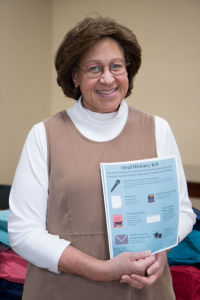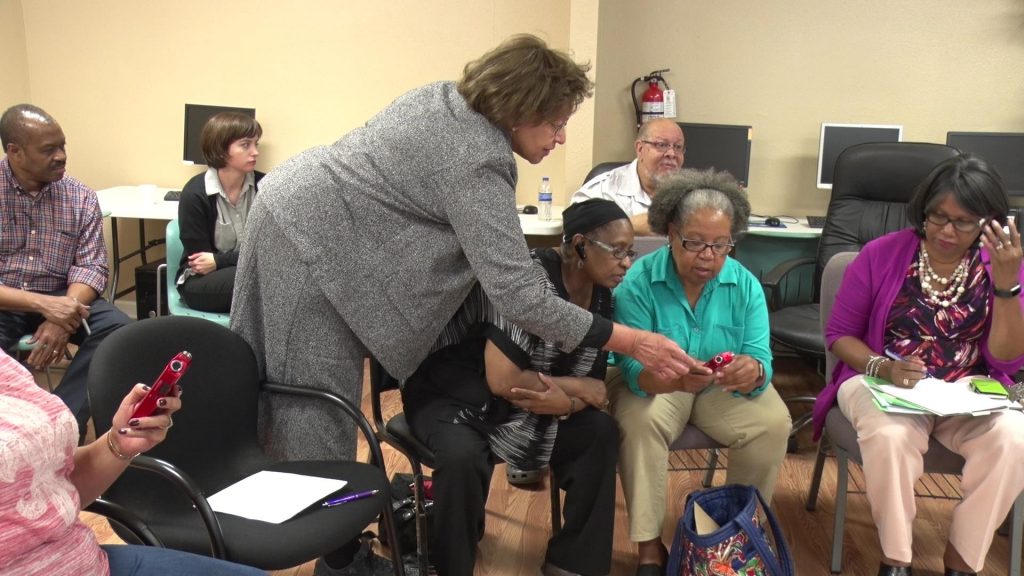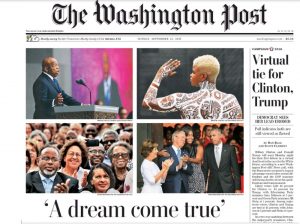According to the former Oral Historian and Project Documentarian for the Community-Driven Archives Team (CDAT), Bernetiae Reed,
“There is so much that you can’t capture with a book, but [rather] with an oral history.”
From the beginning, the Community-Driven Archives Team has prioritized oral history training and the collection of oral histories as a key part of our work. Why?
For one, we know that preserving written and print records alone limits whose histories get told and shared. Passing down written family records from generation to generation is often based on access to time and resources: the ability to create the record and the space and living conditions necessary to preserve it. Second, reliance on the written word is based on a dominant cultural value (read: white, Western), rather than one shared by all families, communities, and peoples.
In addition, for historians, archivists, researchers, historic interpreters, artists, and curators, oral histories literally have a voice of their own, which can helpfully guide our storytelling. When someone shares their story through an oral tradition, we hear their interpretation of their life in their own voice and words. Public Historian Michael Frisch talks about the collection of oral history interviews in terms of “shared authority,” the idea that archivists and historians collect stories in negotiation with those willing to share them. As oral history interviewers, we learn what community members want to share with us.
Alabama-based documentary filmmaker Theo Moore reminds us that the most important part of telling a story is first listening carefully to what others who lived it are saying. Oral histories can be a guidepost for storytelling, anchoring us in community voices rather than our own narrative. For many researchers and documentarians, collecting oral history interviews is a starting point for new research, given the gaps and silences in many archives when it comes to the histories of marginalized communities.
According to Bernetiae, oral histories help lend “an accurate voice” to a story. During her time as on staff at the Wilson Special Collections Library, Bernetiae edited oral histories for use in a number of exhibits, as well as for websites and digital storytelling. In March, the CDAT said a fond farewell (for now) to our friend and colleague, who left our grant team to continue to pursue her passions as an oral historian and documentarian of the US South.

During her time with the CDAT and the Southern Historical Collection (SHC), Bernetiae collected dozens of oral histories with our project partners in North Carolina, Kentucky, Tennessee, Texas, and Florida. She remembers a road trip with women leaders of the Appalachian Student Health Coalition (ASHC), a group of Vanderbilt University medical and nursing students and rural community leaders who self-organized in the ‘60’s and ‘70’s to deliver needed medical care to Appalachia. Bernetiae sat in the backseat and filmed their reminiscences of their days traveling through the mountains to provide care.
Listen to Bernetiae talk about why oral histories have been so important to our Community-Driven Archives project:

She remembers the spiral staircase in the home of famed Greensboro, NC Civil Rights movement lawyer J. Kenneth Lee during her and SHC Curator Biff Hollingsworth’s interview with him, one of the few recorded interviews that he agreed to before he passed in 2018. Lee represented the majority of 1,700 court cases with defendants who participated in civil disobedience as part of the sit-in movement.
Bernetiae herself has played key role in documenting Black history in the US South and beyond. She grew up in Greensboro, where her mother was the founder of the Mattye Reed African Heritage Collection, named in her honor, at North Carolina A&T State University. Starting out researching her own genealogy, Bernetiae went on to publish a book about some of her ancestors and their ties to the family of enslaver and former US President, Thomas Jefferson.
Listen to Bernetiae talk about how she got her start as an oral historian and genealogist:
Bernetiae has donated collections from her family archives as well as her research to the National Museum of African American History and Culture, the International Civil Rights Center and Museum, and also here at the Southern Historical Collection at Wilson Special Collections Library.

We miss you, Bernetiae!
Check out Bernetiae’s webinar recording on conducting oral histories to learn about her perspective on best practices:
For more about oral histories on the Southern Sources blog:
The Community-Drive Archives Project at UNC-Chapel Hill is supported by a grant from the Andrew W. Mellon Foundation.
Follow us on Twitter @SoHistColl_1930
#CommunityDrivenArchives #CDAT #SHC
